The coronavirus outbreak has underscored the prominent role that science news and information can play in public life, and there are signs that Americans are now paying more attention to science news.
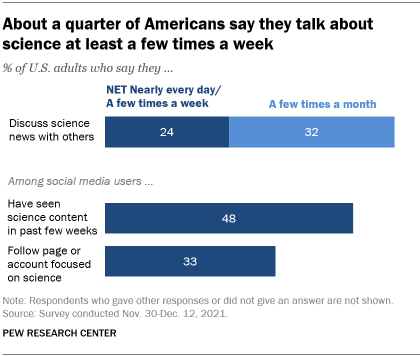
More than half of U.S. adults (56%) say they talk about science news with others at least a few times a month, including about a quarter (24%) who say they talk about science news at least a few times a week. The remaining 43% say they do so less often, according to a Pew Research Center survey conducted in December 2021.
Americans’ engagement with science news in everyday discussion is higher than in a 2017 Center survey, when 44% said they talked about science news with others at least a few times a month.
Pew Research Center conducted this study to understand Americans’ engagement with science news. The analysis is based on a Center survey of 14,497 U.S. adults conducted from Nov. 30-Dec. 12, 2021.
Everyone who took part in the survey is a member of the Center’s American Trends Panel (ATP), an online survey panel that is recruited through national, random sampling of residential addresses. This way, nearly all U.S. adults have a chance of selection. The survey is weighted to be representative of the U.S. adult population by gender, race, ethnicity, partisan affiliation, education and other categories. Read more about the ATP’s methodology.
Here are the questions used for this analysis, along with responses, and its methodology.
The survey that this post is based on is made possible by The Pew Charitable Trusts, which received support from the Chan Zuckerberg Initiative.
Online, about half of adult social media users in the United States (48%) say they have seen science content on social platforms in the past few weeks, while 33% go further and say they proactively follow a page or account that focuses on science news. The share of social media users who say they follow an account focused on science content is also higher than in 2017, when 26% said they did this.
Science can bring to mind a range of topics for people, including health and medicine, artificial intelligence, and space exploration. In the 2021 survey, there is some variation in how often Americans talk about and follow accounts on specific science-related topics, including health and medicine, the coronavirus outbreak, and energy and the environment. (Read the topline for more details.)
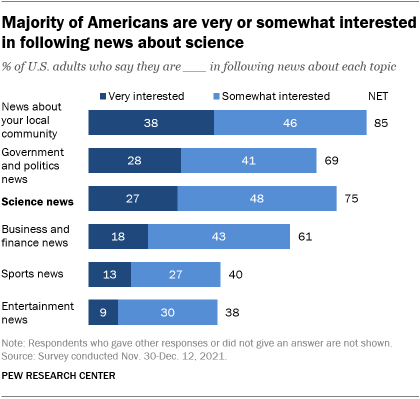
Overall, three-quarters of Americans express some level of interest in following news about science, according to the 2021 survey. About a quarter (27%) say they are very interested in science news, while another 48% say they are somewhat interested. Public interest in science news outpaces interest in topics such as business and finance, as well as sports and entertainment, though it is below public interest in news about one’s local community. As expected, those who are very interested in science news are especially likely to say they talk about science news frequently and, among social media users, to follow science-related accounts on social media.
Interest in following science news is up modestly from 2017, with the share of adults who are at least somewhat interested 4 percentage points higher than it was then.
Education is one of the biggest factors behind interest in and engagement with science news and information.
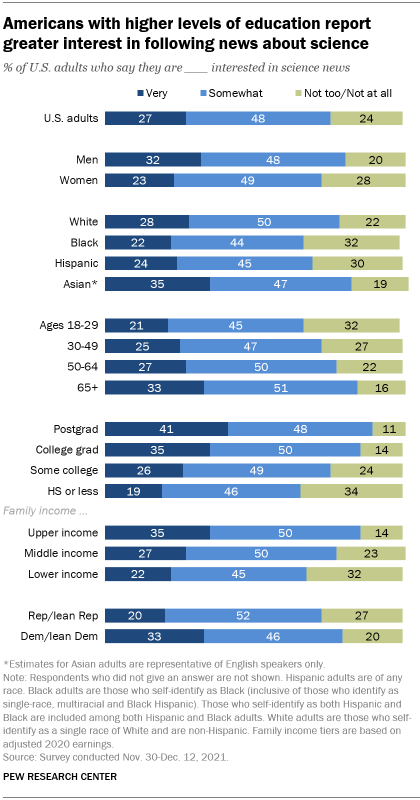
Around four-in-ten postgraduates (41%) and 35% of college graduates say they are very interested in following science news, compared with 26% of those with some college experience and 19% of those with a high school diploma or less education.
Interest in science news also tends to be higher among men than women, as well as among those with higher than lower family incomes.
Democrats and independents who lean to the Democratic Party (33%) are more likely than Republicans and Republican leaners (20%) to say they are very interested in following science news. The share of Democrats who are very interested in following science news is 5 points higher than in 2017. Among Republicans, there’s been a modest increase in the share who are at least somewhat interested in following science news but little change in the share who say they are very interested.
At a moment when debates over science-related issues are often polarized along partisan lines, a large share of Americans express frustration about the amount of partisanship surrounding science news.
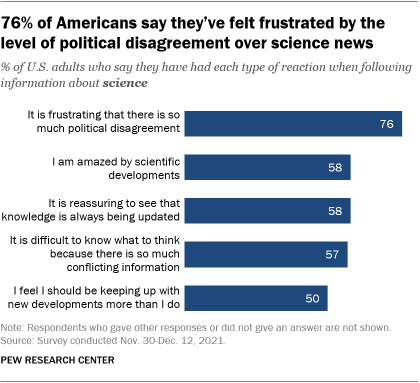
About three-quarters (76%) of Americans say, when following science news, they’ve felt frustrated that there is so much political disagreement in this area. Notably, this sense of frustration is shared by identical shares of Republicans and Democrats (78% each). A separate Center survey this year found partisan disagreement is also among the top factors Americans believe has contributed to problems the country faced dealing with the coronavirus outbreak.
Reactions to science news also include positive sentiments. Majorities of Americans say they’ve felt amazed by scientific developments (58%), while the same share say they’ve felt reassured that knowledge is continually being updated when following science news and information.
Still, 57% of Americans express some level of confusion when it comes to science news, reporting that they feel it is difficult to know what to think due to so much conflicting information. And half of Americans feel they should be keeping up with new scientific developments more than they currently do; roughly as many (48%) say they don’t feel this way.
College graduates and Democrats are more likely to report positive reactions to science news. Three-quarters of those with a college degree or more education say they have felt amazed by new developments, and 73% say they have found it reassuring to see that scientific knowledge is always being updated. By contrast, about half of those with some college or less education report either of these reactions. Democrats, meanwhile, are 20 percentage points more likely than Republicans to report feeling amazed by scientific developments (68% vs. 48%) and 24 points more likely to feel reassured that scientific knowledge is always being updated (70% vs. 46%).
Among those with higher and lower levels of education, similar shares say it can be difficult to know what to think because there is so much conflicting information in science news. But Republicans are much more likely than Democrats (70% vs. 47%) to say they have had this reaction when following science news.
When it comes to making sense of information about science, a majority of Americans (74%) say they can rely a lot (36%) or some (38%) on information from scientific experts in this area. Friends and family also rank high on the public’s list of who they can turn to about science information: 55% say they can rely a lot or some on science information from close friends and family. Fewer Americans (44%) say they can rely a lot or some on information about science from journalists.
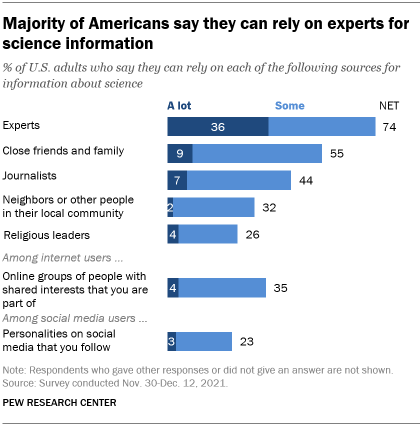
Among internet users, about a third (35%) say they can rely on science information from online groups of people with shared interests that they are a part of. Other potential sources rank lower on the public’s list of who they can rely on for science information.
Partisan affiliation is connected with views of the reliability of journalists and experts for science information.
Democrats are much more likely than Republicans to say they can rely at least some on science information from journalists (63% vs. 23%). While majorities of both partisan groups say they can rely on experts for information about science, a somewhat larger share of Democrats than Republicans say this (82% vs. 66%).
These differences are consistent with gaps between Republicans and Democrats in overall levels of trust in journalists and in scientists. By contrast, when it comes to reliance on other sources for science information, such as close friends and family, Republicans and Democrats express largely similar views.
Note: Here are the questions used for this analysis, along with responses, and its methodology.




